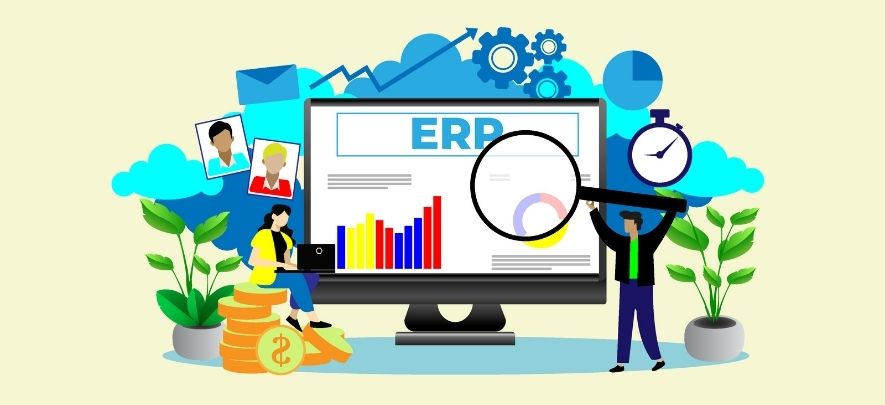Small is beautiful: Investing in ERP - making ‘small’ even more beautiful

Business Development
188 week ago — 11 min read
In my previous articles we looked at how adopting technology can help not only SME businesses but also the economy and how technology can be an enabler for SMEs.
In this third article in the series on SMEs, we look at adoption of a technology platform such as an ERP (Enterprise Resource Planning) solution and how, if at all, it may act as a first step towards more efficiency, profitability and growth in this sector.
ERP in simple terms is a business management system which provides an integrated solution by streamlining the whole business activities by using a common pool of data.
India has 6.33 crore MSMEs out of which 6.30 crore—99.4 per cent are micro-enterprises. The number of registered MSMEs in FY20 has increased by 18.49 per cent to 25.13 lakh units from 21.21 lakh in FY19, according to government data.
SMEs are both an engine of job creation and a significant factor in job destruction. For example, EU research found that as few as 65% of firms that started trading in 2014 survived beyond five years.
But in spite of the huge number in this sector, growth in the SME sector has been mostly below average.
It is understandable that SMEs are particularly affected by market turbulence and that their position is clearly unfavorable in the newly created world economic circumstances. SME problems are reflected in reduced demand, difficult access to markets in India and abroad particularly capital markets, lack of availability of quality manpower and technology and sometimes lack of well-defined processes and systems within the entity.
Technology is driving growth and more SMEs are now open to adopting ERP.
Also read: Implementing ERP is no longer an ‘if’ but ‘when’
Manufacturing SMEs are now looking at adopting technologies that will help them scale their business and give them a competitive edge. While a significant number of them are still at a basic technology adoption level, others are fast moving to more mature levels and are welcoming new age technologies.
Along with tremendous growth opportunities in this segment, it has become a big challenge to grow, considering the competition in this segment is now not only from domestic companies but from companies all over the world. This is especially true of SME companies in the third world and developing economies. It has now become imperative for the SME owner to be on the lookout for newer opportunities in the emerging markets.
Let us start, by listing down, few business challenges being faced by this sector. Most of the SME owners we have met are bogged down by almost similar problems, that of retaining existing customers, acquiring new customers, expanding their reach to cover a wider spectrum of geographies, on time deliveries, keeping track of inventories, man management and cash management, to name a few.
One of the key drivers of business growth in the SME is the level of IT usage as an enabler of well-defined business processes.
In this article we will try to cover some challenges and benefits of upcoming technologies like ERP for the SME.
Let us start by defining ERP in simple terms as a business management system which provides an integrated solution by streamlining the whole business activities by using a common pool of data. According to a study conducted by our company, the majority of the SME, especially in the manufacturing sector are still wary of using ERP as an enabler of their business. ERP implementation is regarded as complicated and cumbersome, difficult to integrate in the existing systems and, mostly exceeds the initial estimated cost. This also results in time overruns many times defeating the primary purpose.
Most of the SME owners bemoan:
- Lack of understanding of their internal processes by the ERP vendor thus starting the ERP implementation with an adjustment of sorts. This often creates a feeling of distrust between the vendor and the functional teams at the SME.
- ERP vendors, according to the SME, are also sometimes accused of initially discussing a complete scope of work (covering the wish list of the customer) and later backing out of their commitments OR demanding more resources citing “complicated processes” at the customer end.
- Other SMEs also complain of vendors initially involving senior and experienced resources for implementation but later allocating inexperienced and junior resources for this work.
- Some of our surveyed customer even complained of junior resources being allocated as Project Managers, a euphemism for a face at the customer site, with little knowledge of the customer processes.
The ERP vendors on the other hand complain of cost and time constraints by the customer resulting in such shoddy work at times.
SMEs need to adopt a proactive approach towards ERP and consider it as a business transformation solution rather than a mere IT solution.
Some of the advantages to be considered include:
- Clearly business benefits of using ERP
- Standardisation across functions and processes
- Better management of remote/sales locations
- Centralised support facilitates (integration)
- Cost effectiveness
- Better ROI on existing investments
- Operational efficiency
- Scalability
- Improved reporting and tracking system
- Improved customer relationship and customer experience
- Business analytics to plan and forecast better
Also read: On-Premise ERP vs Cloud ERP
Let us list down some challenges being faced by the SME for a successful implementation of the ERP and then suggest some crucial win criteria for this.
Challenges in ERP implementation
- Perception of an ERP is that of a complex system mainly suited for large organizations who have well defined processes and “money to burn”, to quote an SME. Most SME feel they have some “unique” system of working, where “no ERP will work”
- The level of awareness among the SME is low about what exactly will be the business benefit be.
- There seems to be a massive anti feeling about ERP, not being helped by too many failed implementation stories amongst their peers. Our surveys indicate more than 60% unsatisfied users of ERP in the SME space.
- All stakeholders not being taken in confidence, before the start of the project, is a major contributor to the low level of success of ERP implementations. We have had cases of major differences happening in certain functions when “informed” of the management and IT decision to implement ERP, without taking them in confidence.
- Customer’s existing processes not being studied is also a major hurdle. A proper “As Is” study is mostly avoided due to the high cost associated with it. This is where consulting companies like ours come into the picture. We study the business process and offer an independent advice on the readiness of the SME to use ERP and actual benefits that the ERP will offer.
- ERP vendors suggesting products that do “not” fit in the customers processes. We have too many instances of adjustments happening on both sides, later, in such cases.
- Change management issues not handled in the right manner. We have seen too many of these across all SME, where a fear of the unknown (technology) results in sub-par performance by the team at the customer end.
- Too many SME still consider ERP implementation as an IT project, instead of considering it as a first step to the Business Transformation Process.
- While it is generally agreed that many stand-alone business solutions may have a better fit for SME, then the ERP solutions available, the onus is on the ERP vendor to integrate the existing processes in the ERP solution being offered for a near perfect fitment.
Also read: ERP evaluation tips: Questions you should be asking
We consider the following as crucial success criteria for a successful implementation:
- Top management commitment: The leadership team has to be fully convinced of the usefulness of the exercise, generally keeping the teams motivated
- Change Management: Too many decisions by the Management without the active involvement of the functional heads and the respective departments may result in disquiet and an uneasy environment. This issue needs careful handling by experts who understand the issue well and convince the functions of the benefits to all. Also involves training and retention techniques.
- Expectation setting: We have not seen many ERP vendors talk of what the ERP will NOT achieve. The expectations have to be clearly defined and well articulated.
- Defining and handling all stakeholders: Define and manage all Internal and external stakeholders. This should be in conformity to the Project Management plan.
- Learning and development (coaching) and Employee retention: Have a well-defined roadmap with clear goals
- Data collection processes (the four V’s of data): The Volume, Velocity, Veracity and the Variety of data to be considered before designing the systems.
- Parallel systems: The existing application may be replaced totally or partially by the new ERP system. All the implementation processes should be carried out without affecting the daily operations
- Software design and processes defined: The process involves a thorough examination of the business processes in the SME; selection of the best available software solution that matches the requirements of the SME and proper configuration of the selected systems.
- Level of customisation to be less than 15-20%: Perhaps one of the biggest reasons for the low success rate of ERP implementation. This normally leads to cost and time overruns.
- Proper Project Management plan: Defining the dependencies and the likely impact on the final deliverables. Also having an effective monitor and control mechanism is crucial.
In India, SMEs are the backbone of the economy and are today faced with global competition. Therefore, it becomes imperative for them to look for means of responding to the dynamic markets. ERP systems have become the most common IT strategy for most large companies. SMEs too are moving towards ERP systems. They need to adopt a proactive approach towards ERP and consider it as a business transformation solution rather than a mere IT solution.
Also read: One small step by the SME owner…a giant leap for the economy
To explore business opportunities, link with me by clicking on the 'Connect' button on my eBiz Card.
Image source: shutterstock.com
Disclaimer: The views and opinions expressed in this article are those of the author and do not necessarily reflect the views, official policy or position of GlobalLinker.
Posted by
Sameer MathurSM Consulting (www.smconsulting.in) is a New Delhi based Business and Technology Advisory. We guide our customers on their journey towards adopting Technologies to achieve their...
View Sameer 's profile
Other articles written by Sameer Mathur
Impact of Covid-19 on the IT Infrastructure industry
175 week ago
Most read this week
















Comments
Please login or Register to join the discussion